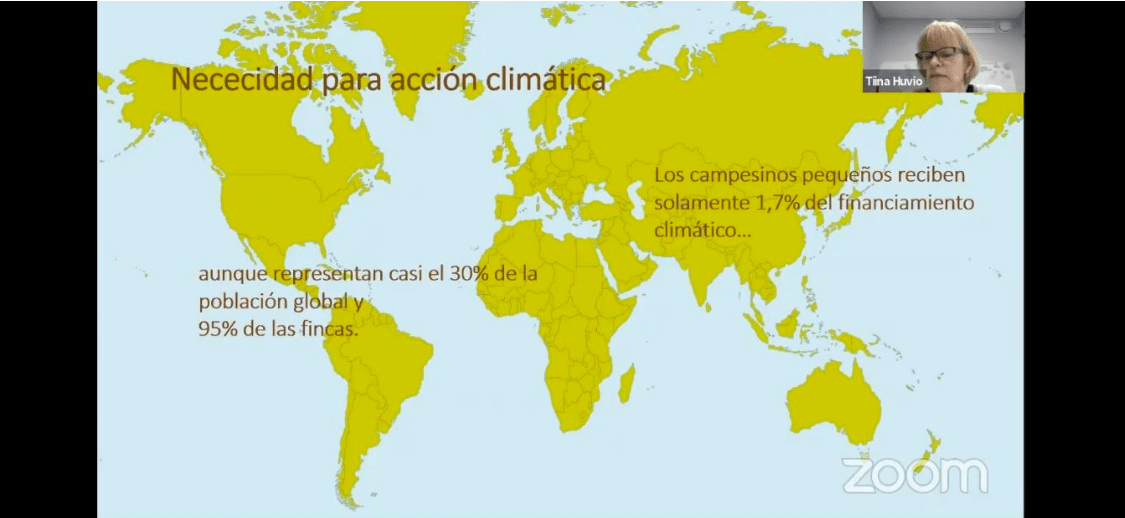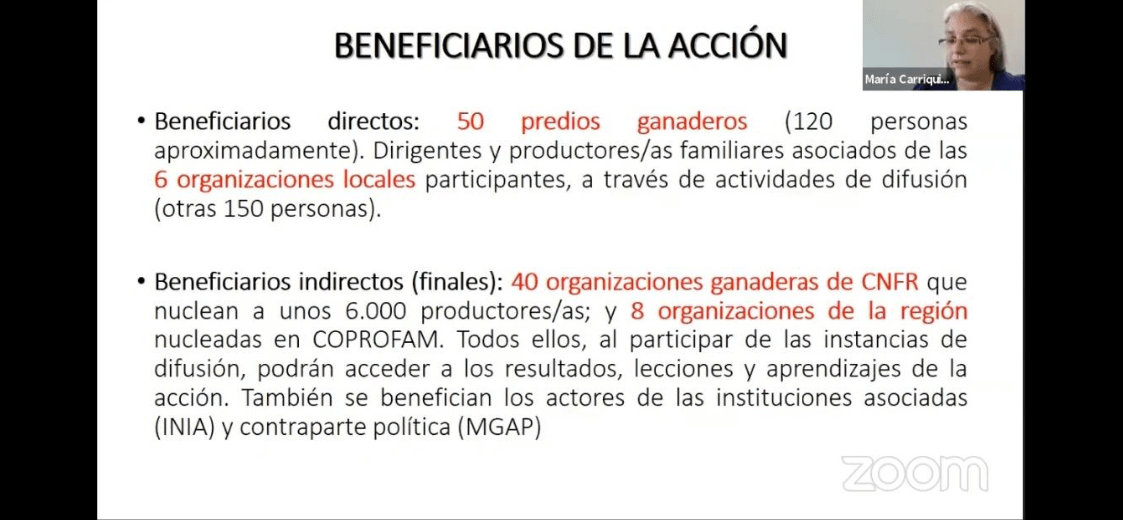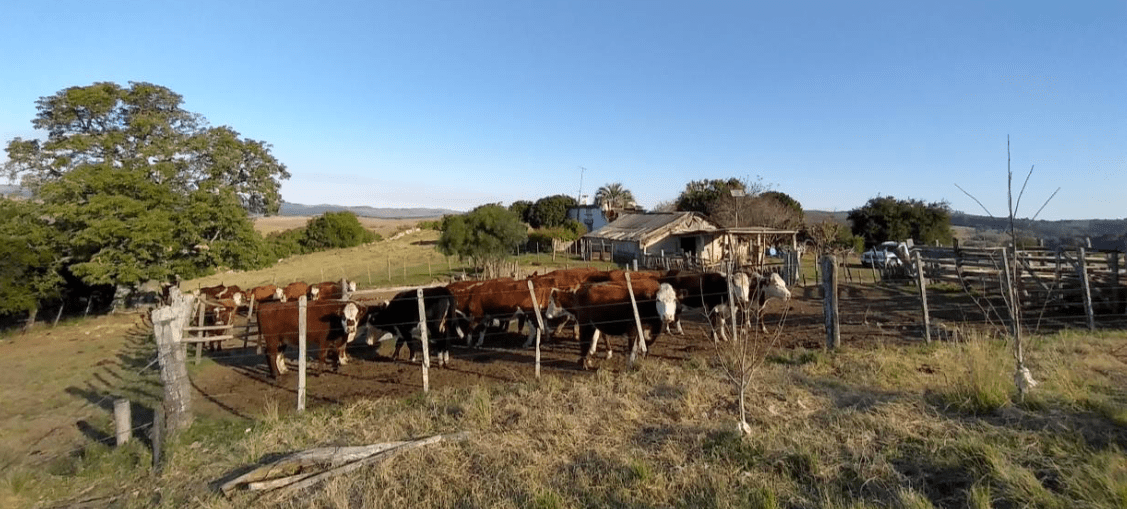Innovation as an opportunity in a context of climate change has been at the centre of the experts' discussions.
November 24, 2020, Montevideo, Uruguay - The National Commission for Rural Development (CNFR), together with the Confederation of Family Farmers' Organisations of the Extended Mercosur (COPROFAM), in the framework of the implementation of the project "Resilient Family Livestock Production" in partnership with INIA and with funding from the EUROCLIMA+ programme, held the International Seminar "Climate Change, Innovation and Resilient Food Production: scenario of opportunities".
At the seminar, which is part of the Climate Framework Programme (CFP), international experts provided useful recommendations for family farmers in the face of the challenges posed by climate change. The experience of the Resilient Family Livestock Production project in Uruguay is a background to consider in the framework of the actions that the Climate Framework Programme is considering in addressing the challenges of family farmers.
It was opened by Mr Alberto Broch, President of COPROFAM and a member of the World Rural Forum, and Mr Markus Handke, Head of Cooperation, European Union delegation in Uruguay. The meeting then took place around three blocks of presentations, taking into account their different political, scientific, and technical dimensions.
 |
Farmers and climate financing
The first block addressed the main characteristics and importance of climate change and resilient global food production: Climate Change and the Challenges for Resilient Food Production, by Walter Baethgen of the International Research Institute for Climate and Society at Columbia University and Vice President of the National Institute of Agricultural Research of Uruguay; the Importance of Best Practices for Resilient and Low-Carbon Food Production, by Gervasio Piñeiro, from the of Agronomy Faculty of the University of the Republic, Uruguay and the Agronomy Faculty of the University of Buenos Aires; and The challenges of MERCOSUR countries in the framework of the Paris Agreement, by Walter Oyhantçabal, from the Sustainability and Climate Change Unit of the Ministry of Livestock, Agriculture and Fisheries of Uruguay.
The second block dealt with the institutional articulation for innovation, with the contributions:
- Conceptual view of articulation between institutes and producers, AS and Resilience, Innovation and Digital Agriculture, by Rubén Echeverría (CGIAR - FAO);
- Producers' position on climate finance: AgriCord's vision and intent, by Tiina Huvio, AgriCord Representative and Director of FFD Programmes;
- Ambition meets reality: achieving GHG emission reduction targets in the livestock sector, by Jacobo Arango of Bioversity International Alliance's Tropical Fodder Programme;
- EUROCLIMA+, a tool for the promotion of experiences that contribute to the fulfilment of countries' climate commitments in Latin America, by Claudia Cordero, Representative of the RFP sector of the Euroclima+ programme for GIZ; and
- Climate change and the challenges for resilient family production, its organisations and public policies, by D.Fernando López, Leader of CNFR - COPROFAM
Finally, the third block was dedicated to the presentation of the Resilient Family Livestock Production project, by Maria Eugenia Carriquiry, Project Coordinator, with contributions from Alfredo Albín, director of the Family Production Programme of INIA - Uruguay, who gave an account of the Background to Co-innovation in family livestock production in Uruguay and closing the block was Carlos Mermot, Coordinator of PDRT-COPROFAM-FIDA, with a talk on Synthesis and challenges.
The experience of this project in Uruguay is an antecedent to be considered under the framework of the actions proposed by the Climate Framework Programme (CFP) to address the challenges of family farmers and their organisations in the face of climate change, since it provides elements in multiple senses: access to climate financing, the construction of alliances with research institutions, direct action by family farmers in the implementation of technological measures and practices for mitigation and adaptation from a co-innovation approach, and the systematisation of the lessons learned necessary for effective territorial and temporal scaling-up, from the global perspective of the CFP.
 |
Beneficiaries of the Resilient
The virtual seminar was closed with the reflections and comments of Mr. Lautaro Viscay, Technical Secretary of the Specialised Meeting on Family Farming for MERCOSUR, and Mr. Fernando López, representing COPROFAM.
Climate Framework Programme (CFP)
While it is a fact that farmers are responsible for about 5% of global GHG emissions, they also create carbon sinks through afforestation, conservation tillage and agro-forestry. Farmers' Organisations (FOs) play a crucial role in promoting these low emission agricultural practices, controlling deforestation, and restoring degraded lands. As these efforts are often fragmented and small-scale, FOs need resources to build cross-sectoral associations for implementing climate measures at all scales: local, national, and global.
In response to this call, the Confederation of Family Farmers' Organisations of the Extended Mercosur (COPROFAM), FOs from other continents and AgriCord, have joined forces to create the Climate Framework Programme (CFP), aimed at creating a fund for the FOs to address the concerns of family farmers and their organisations with respect to climate change, mobilising international climate funding support, creating partnerships with research institutions and the private sector to leverage available resources and specialised expertise.
Resilient Family Livestock Production: the contribution from a specific experience
The Resilient Family Livestock Production (RFLP) project is an initiative of the National Commission for Rural Development (CNFR) of Uruguay, under the framework of COPROFAM, which is being implemented jointly with the National Institute of Agricultural Research (INIA) of Uruguay, with funding from the EUROCLIMA+ Programme, Resilient Food Production sector. The objective of the RFLP project is to improve the resilience of family livestock systems to climate variability and change, contributing to reducing the technological gap through the implementation of validated Best Livestock Practices, and generating useful information and knowledge about the productive and social processes involved.
See the video of the event:
For more information
- This email address is being protected from spambots. You need JavaScript enabled to view it.
- @GFResiliente
- Cnfr Uruguay
